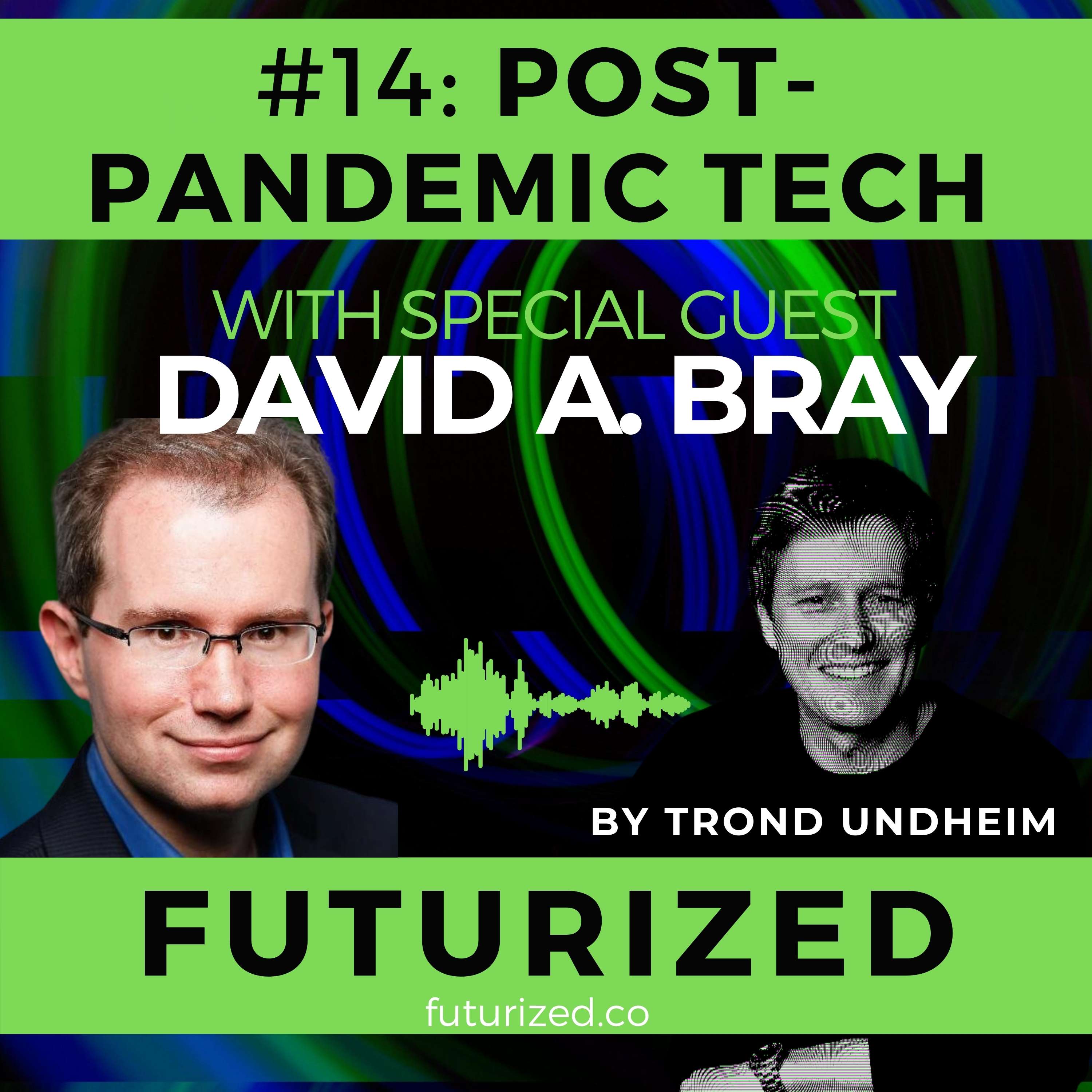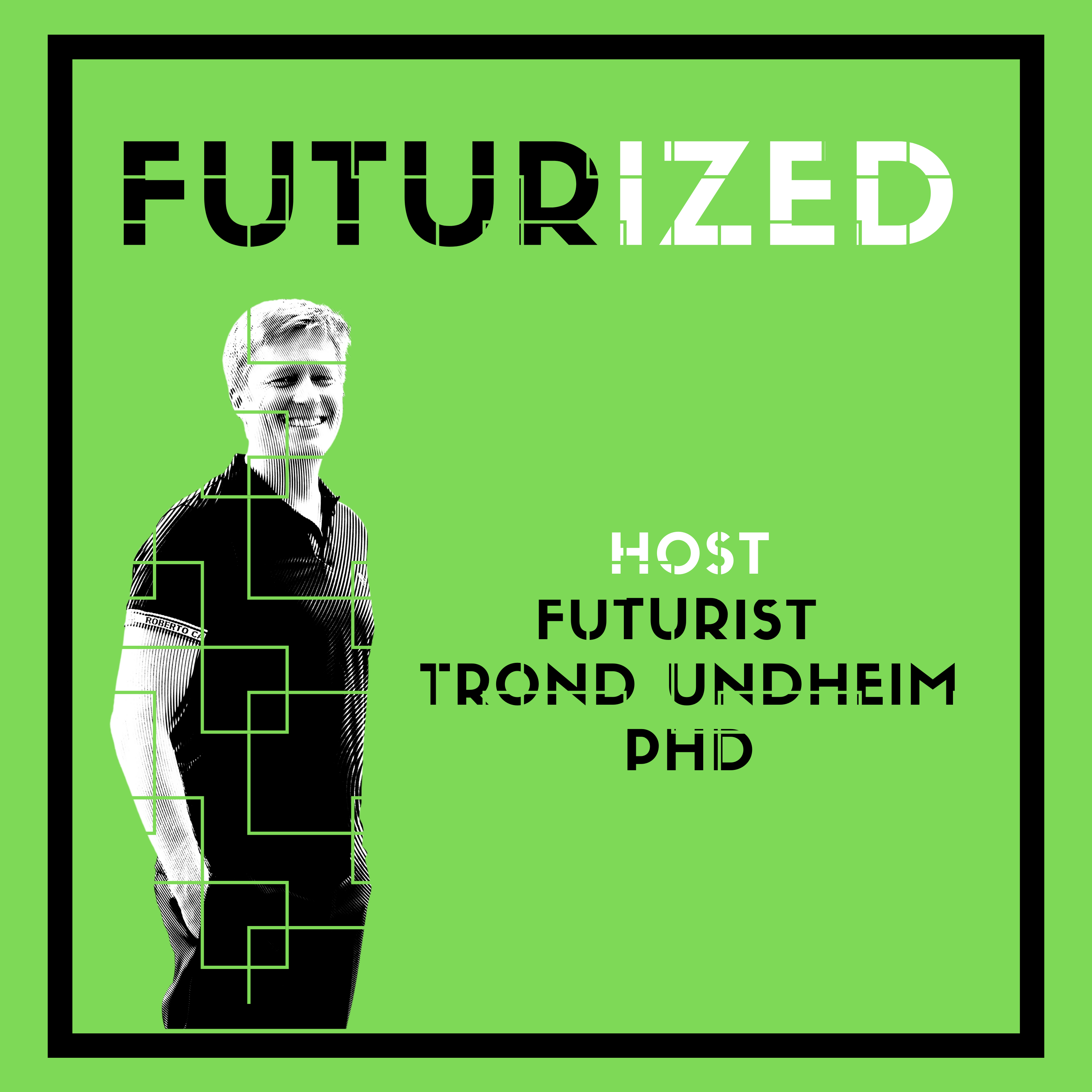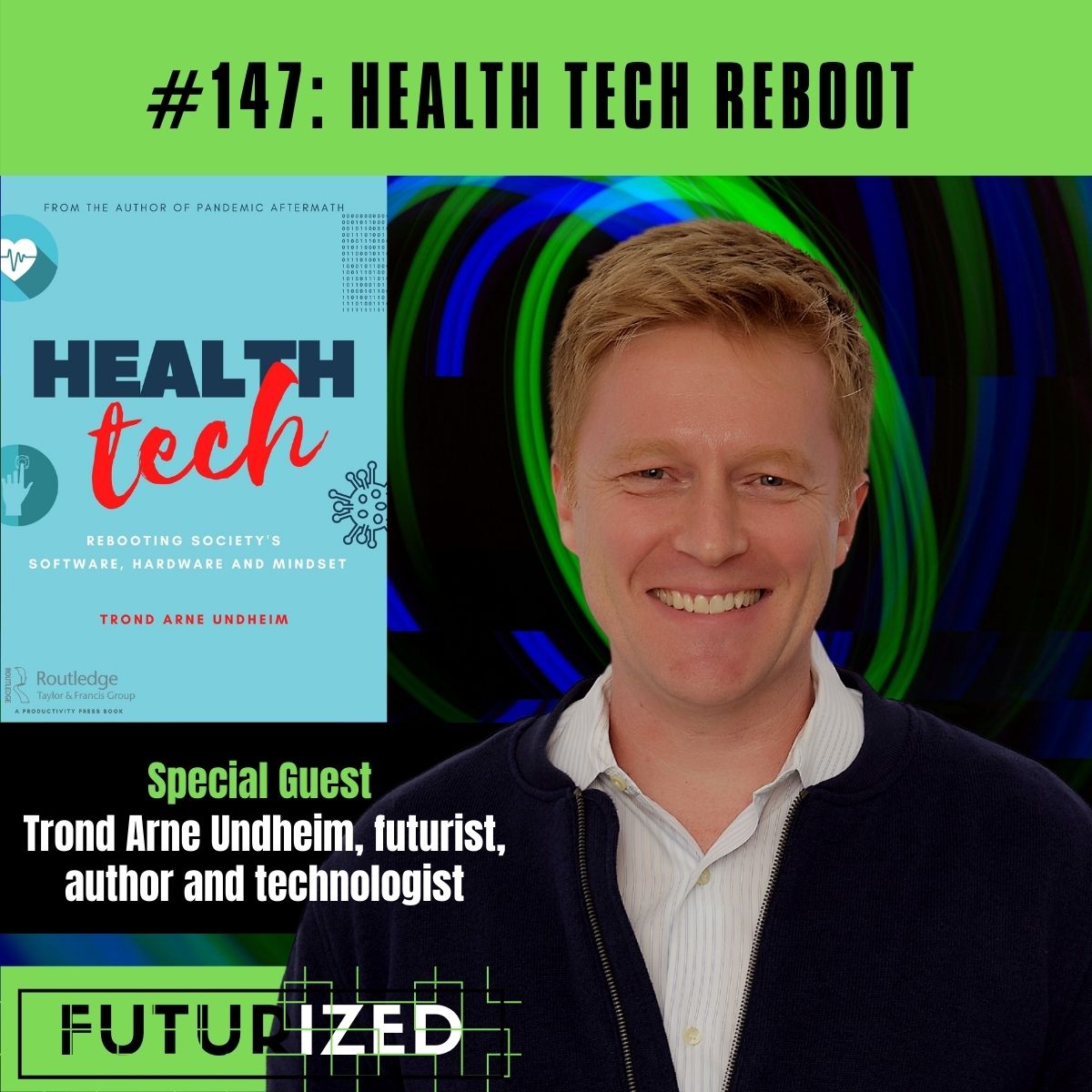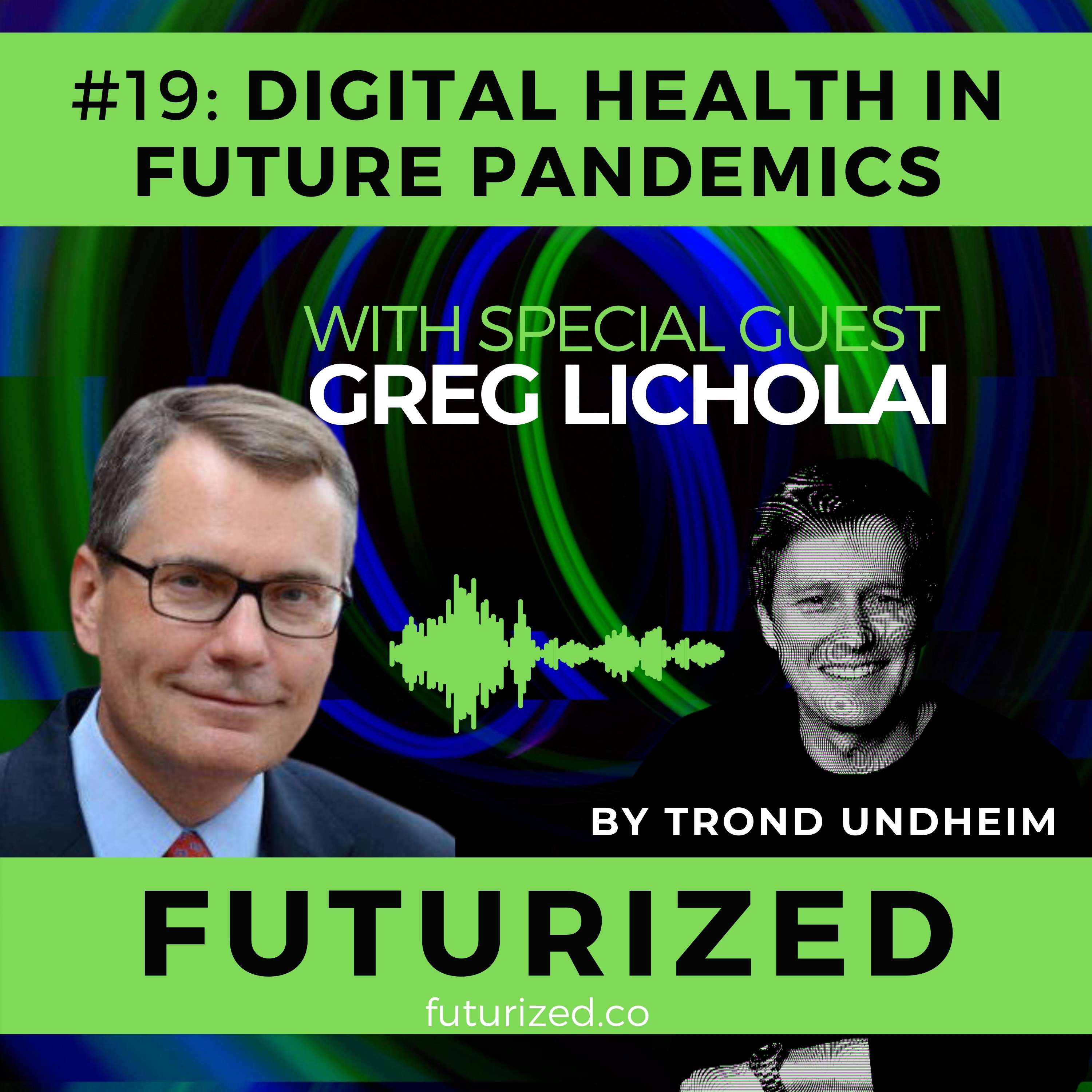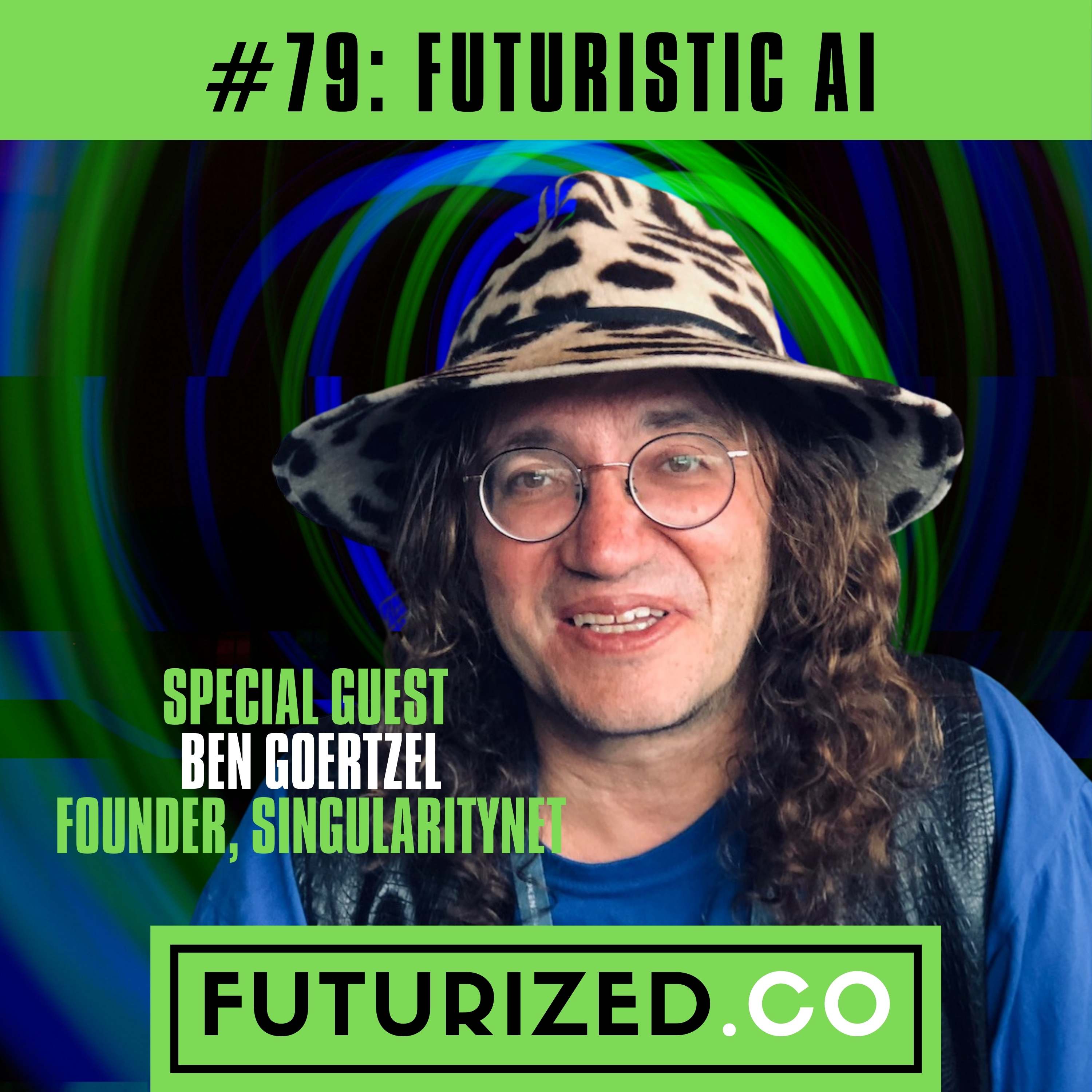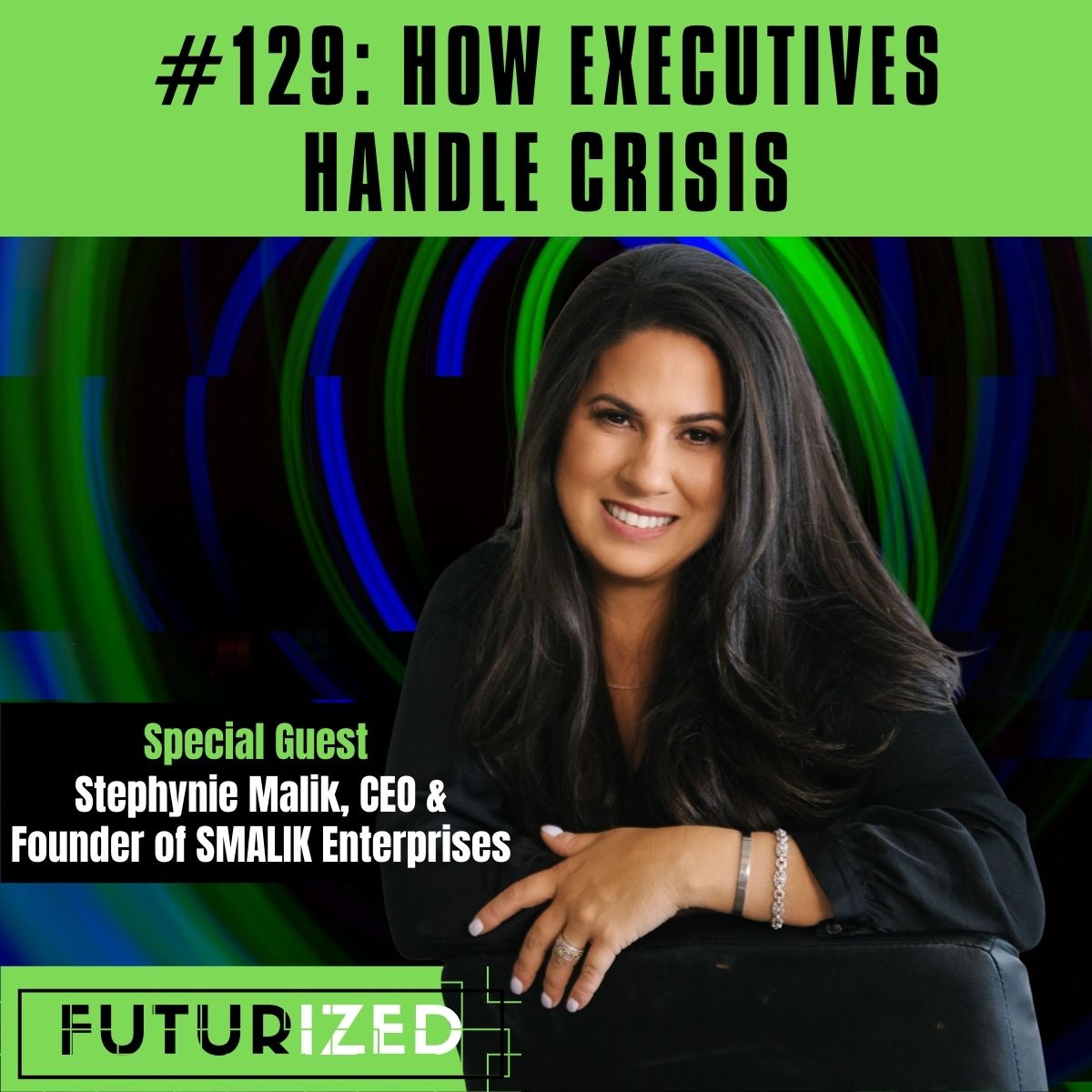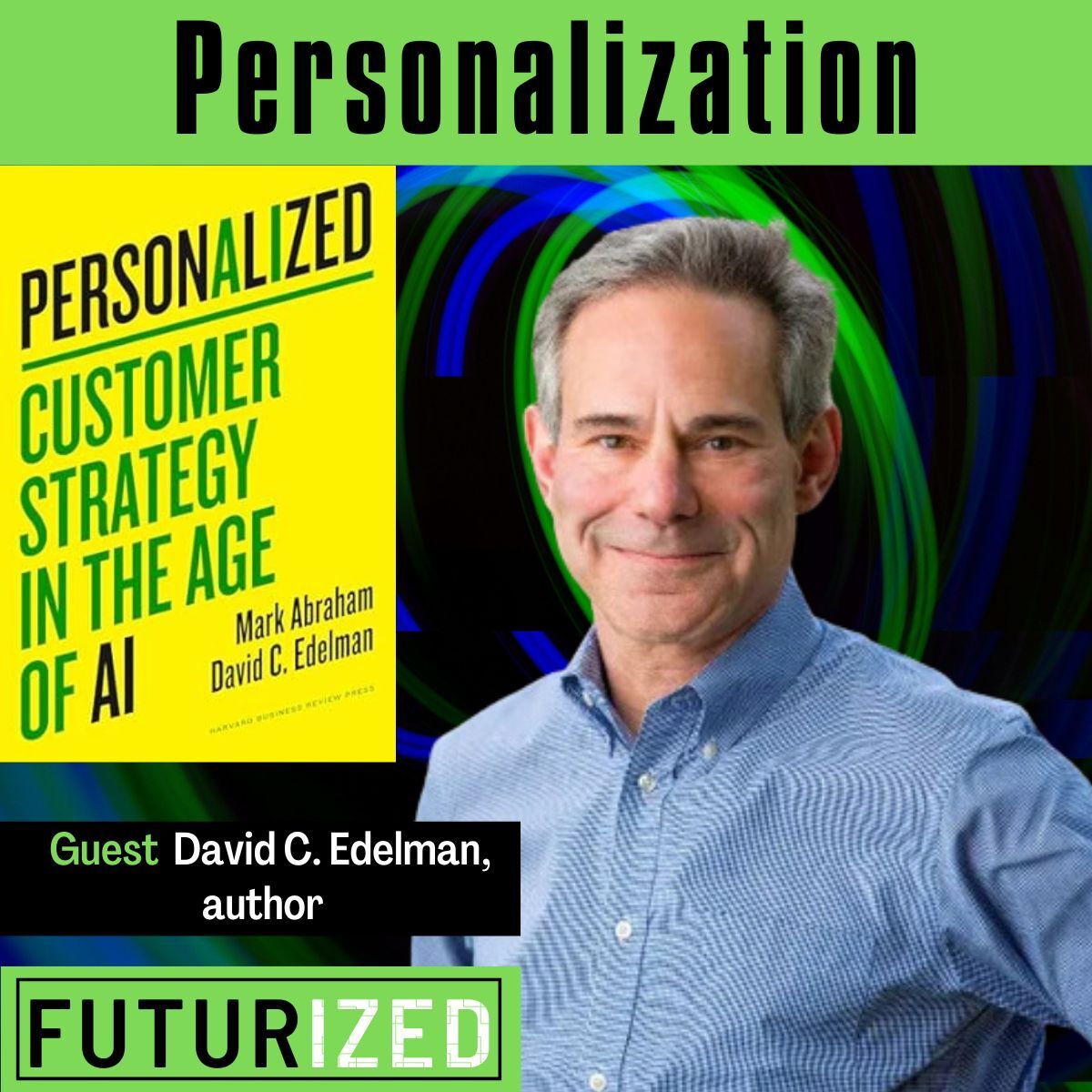The Future of Virtual Care
Dr. Joe Kvedar, Professor of Dermatology, Harvard Medical School, author, editor, advisor and telehealth evangelist, interviewed by Trond Arne Undheim, futurist, investor, and author.
In this conversation, we talk about the history Telehealth and it's tr...
Dr. Joe Kvedar, Professor of Dermatology, Harvard Medical School, author, editor, advisor and telehealth evangelist, interviewed by Trond Arne Undheim, futurist, investor, and author.
In this conversation, we talk about the history Telehealth and it's transformation into a two-channel delivery system combining in-person and virtual care. A precursor in the field, Joe charts the 20 year evolution from "show me the data" to "how do I implement?". We briefly discuss the use case of Melanoma therapy and AI/imaging from Kvedar's own field, dermatology. We discuss COVID-19 effects and other disruptive forces. Joe shares the startups he sees disrupting the game and how he stays up to date. We cover the emerging two-channel care delivery system and discuss the future of virtual care in the next decade.
My takeaway is that Telehealth has come a long way in 20 years and it's not just about the technologies, but it is also about adapting to a hybrid model of care where you each time select the communication mode that best serves the patient given the constraints, and still is efficient for the health system at large. The future of virtual care is up for grabs, it is already starting to look different from five years ago. Leapfrogging seems entirely possible and we will see new winners but also old champions rise to the challenge having invested time and resources in the area for decades. What's certain is that both infrastructure and skills will need to evolve with the challenges and opportunities ahead.
Having listened to this episode, check out Harvard Medical School as well as Dr. Joe Kvedar's online profile:
- TEDx Talk: Why Humans are the Future of Digital Health | Joe Kvedar | TEDxBeaconStreet - YouTube
- Harvard Medical School (@harvardmed): https://hms.harvard.edu/
- Dr. Joe Kvedar (@jkvedar): https://www.linkedin.com/in/joekvedar/
- Homepage: https://www.joekvedar.com/
Thanks for listening. If you liked the show, subscribe at Futurized.co or in your preferred podcast player, and rate us with five stars.
If you like this topic, you may enjoy other episodes of Futurized, such as episode 19, Digital Health in Future Pandemics, episode 55 AI for Medicine, or episode 82 The Future of Digital Health AI.
Futurized—preparing YOU to deal with disruption.
Intro (00:01):
Futurized goes beneath the trends to track the underlying forces of disruption in tech policy, business models, social dynamics, and the environment. I'm your host, Trond Arne Undheim, futurist and author. And this episode of the podcast, the topic is the future of virtual care. Our guest is Dr. Joe Kvedar, professor of dermatology at Harvard medical school, author, editor, advisor, and telehealth evangelist. And this conversation, we talk about the history of telehealth and its transformation into a two channel delivery system, combining in-person and virtual care, a precursor in the field. Joe charts the 20 year evolution from show me the data to how do I implement. We briefly discussed the use case of melanoma therapy and AI and imaging from kit, our own field dermatology. We discussed COVID-19 effects and other disruptive forces. Joe shares the startups he sees disrupting the game and how he stays up to date. We cover the emerging two channel care delivery system and discuss the future of virtual care in the next decade.
Trond Arne Undheim, Host (01:13):
Joe, how are you today?
Dr. Joe Kvedar (01:15):
Hey, I'm doing well. Thank you so much for inviting me to be on your program.
Trond Arne Undheim, Host (01:19):
Yes, it's exciting. And you know, I'm so thrilled to have you for many reasons, but you know, you've been involved in a field that everyone has come to feel and touch without even asking for it over the last year. Yes. The it's, it's, it's a, it's a complete change. I, I looked back on some slides I shared with various audiences a year ago in January of 2020. And they, they looked very quaint. The world's changed a lot in and even though the pandemic is a terrible thing for a different telehealth it brought it into people's lives. So we can thank you for that. May I call you Joe? Or do you want me to call you Dr. Kvedar?
Dr. Joe Kvedar (02:04):
No, no. Joe is great.
Trond Arne Undheim, Host (02:06):
All right, Joe. So here's my question. How did you become so interested in telehealth so many years before literally everybody else? Well, it goes back to a trait that I think at least during that part of my career, so we're going back almost 30 years now to the early nineties. And I, at that time, I, I really did believe that if, if I had an insight on anything that I was probably one of the last people on the planet to have that insight, it's an insecurity thing. I've kind of grown out of it nowadays, but so, so that's, that's an important part of the story. What, what happened was I was in a bit of a career shift. I had started my academic career in the laboratory with like many people in the Harvard system and it just wasn't going particularly well for me.
Dr. Joe Kvedar (02:59):
I wasn't that motivated by what I was studying and by the intensity of basic science. So I was looking for other things to do. And my department chair said, well, there's this new technology called digital imaging. We think maybe it could be of high enough resolution to substitute for Kodachrome slides. And we might even be able to use it for clinical diagnosis. So I was off looking at that technology in a very specific research project. And I literally had an epiphany one day that gee, if this works, that we can separate the knowledge of clinical care from being in the same room with a patient. And I thought that opens up so many opportunities. The other thing that was happening in the nineties in the U S was this intent and it, and again, it's, it's true now as well, but this intense pressure on whether we wanted to do different kinds of value-based care paradigms and things. So I saw an opportunity for efficiency and and as I said, I said, well, I made this I had this epiphany, I must be among the last people, so I better get going. So I started with earnest and building a team and building a program, and I was convinced that I was late to the game. So that's,
Trond Arne Undheim, Host (04:23):
That's incredible. I mean, you, you were definitely known among the last for sure. So this has been almost I guess, a 20 year evolution and, and, and in the early days I can imagine people were asking the same questions. So I I'm told that there was a lot more, you know, show me why, show me the data, show me why this is important. And, and how has that changed, I guess, only over the last a year. So from 20 years of trying to convince people or something, this is tell me a little bit about the early days. And, and then to this year where I guess the questions aren't really is this even a rational approach, it's, you know, it's happening? How do we do it?
Dr. Joe Kvedar (05:04):
Yeah, that is interesting. So in the beginning there was, it was very much like any, I think medical, any innovation in the medical field gets put through a and, and, and by the way, there's a good reason for this, which is we, we never want to hurt our patients, right? So if I come up with a new, well, let's take laparoscopic surgery as an example, right? We used to take all gallbladders up by cutting you open and removing them. Now you can't that's malpractice, but when laparoscopic surgery came into being, it was a new thing. It had to go through clinical trials. People had to prove it wasn't unsafe and the same applied to telehealth and digital medicine. In the beginning, it was lots of negativity about you know, I have to see the patient, I had a heart failure doctor lecture me, Oh, I have to see the neck veins and you can't this and that.
Dr. Joe Kvedar (05:57):
So it was that skepticism. And so the answer to that was, I, my favorite phrase was, well, I think that's an empiric question. Let's do a test and find out. And so for the first dozen or so years or 10 years anyway, we, we, it was a research project or multiple research projects with the goal of showing that quality would not be eroded. And we did prove that then we shifted into a mode where, and again, that, that the timing is rough. So may, maybe it was more than 10 years that we did the quality part, but we shifted into a mode where people were more like interested in how to solve for workflow and how to solve for reimbursement. And we stayed in that mode really til April or March or April of 2020 when things exploded because of the intensity of lockdown and the insistence of the federal government, at least in the U S and I have some stats from other countries we might want to get to that as well. But the, the federal government in the U S saying, we will relax all these regulatory burdens that we had put on this, this industry. And, and it took off
Trond Arne Undheim, Host (07:11):
Well, let's get into all that, but, but first there are some terms here that are slightly confusing because some of them are legal terms. Others are medical terms. And then again, there's obviously it terms, so I'm just going to kind of line up a bunch of terms here. And if you can clear up whether there's just historically different phases of the development, or do you, they, or, or to the government, they mean different things. So connected health is my understanding what was a term that was used early on. I know telehealth much more. That was certainly in my academic work you know, throughout the nineties and two thousands, that was the term for it. But then digital medicine started to take off in the, you know, have corresponded with the trend in sort of digital and everything was digital. Now it seems like you, at least are starting to call it virtual care. What, if anything, do all these terms mean? And do they have a historical or illegal meaning medical, meaning what, what's the difference between these terms?
Dr. Joe Kvedar (08:09):
Well, I have to be candid with you and say, I I'm. One of the things I don't like about our field is that we keep changing names. And in the beginning, I think people did that because they felt like if they invented a new name, it would, the spotlight would shine, shine on them. So connected health came out of our group. We, we sort of claim credit for, for coining that term. And the reason we coined that term in the mid two thousands, the middle of that decade was because believe it or not, telemedicine was a term nobody wanted to hear. They just sort of said, yeah, we tried that it didn't work. And it was a little bit before the, the era that you just described where it was digital health medicine was kind of the term. So we said, well, we were working with a guy who was doing a lot of research in connected home.
Dr. Joe Kvedar (09:02):
That was his thing. And we sort of said, well, why don't we do connected health? And it took off, but it was purely self-serving in the sense that we wanted people to listen to us. And they did. They're like, Oh, that's interesting. What are you talking about? It was, it was tele-health with with a new name on it. So that happens what you, you didn't mention e-health, you didn't mention M health. Those were for a while, I'll say digital medicine, digital health are very broad umbrella terms that can include everything from supply chain automation to devices, to anything that has a digital component in the, in the ecosystem of, of healthcare, which is again, very broad. Informatics would fall under that. Electronic health records, all part of digital health. And then there's the part about care delivery using technology like video or audio, or asynchronous communication say, over a patient portal, we call that bundle tele-health because it's actually using tele to provide health care. And I think that takes care of most of the ones you mentioned. It, it is, it's again, it's a bit of a a nest of confusion. And, and I don't feel good about that. I have to say virtual wasn't one, I invented, but there was a foisted on me. So I said, okay, fine. If we want to call it that people seem to want to bring a new adjective in, because it somehow makes it like a new thing again. And it's the same old thing. So that's my,
Trond Arne Undheim, Host (10:43):
Well, it's the same old thing. But on the other hand, the word care is different from, from medicine right. Is that the behavioral trend, the last one sort of virtual care, is that because you're focusing more on the kind of behavioral medicine aspect?
Dr. Joe Kvedar (10:58):
I think it's meant to imply that there's a, well, one of the things that digital does is it, it it's a bit of a low it's it democratizes. Right. So we, the first phase of, of that was back when all of a sudden people could get all of our textbooks on the internet and people would walk into my office with, well, I, I diagnosed myself, doc, I have lichen planus, and this is a picture I saw my rash. And, and now of course everything is there and it's much more interactive. So it's meant to imply that the care's a two-way street and the digital tools enable us to have a very interactive care, care experience with our patients. Whereas medicine is much more clinical and it's in its connotation. It's what I, as a clinician feel like I need both to make a diagnosis and a care plan independent of whether I'm going to actually care for someone, if that makes sense.
Trond Arne Undheim, Host (12:00):
That makes a lot of sense, too. I wanted to ask you about some of the emerging and perhaps to you more, most interesting use cases lately, because, you know, we could talk literally about any field of medicine I have you know, I could imagine at least, you know, in, in this day of Corona and, and somebody would have tried it in virtual forum, just because you know, out of out of desperation, perhaps, but also out of it just kind of innovation and but, but need, but what are some of the more interesting cases? I had a couple in mind that I wanted to, to, to touch certainly on imaging. I know that's something that, you know, is relevant in, in any case. And and I had a special interest to just hear your, your take on melanoma since that's your, well, I guess one of your fields but what are some of the other, I mean, a very basic one would seem to be kind of online triage. I mean, the very fact that we can't just, or, or one would think you know, even at MGH to try to limit people coming into the hospital. So, so triaging people in a somewhat more advanced way than the usual sort of phone tree, ours used to be. Tell me a little bit about how how the use cases are evolving and what you are looking at as the more insightful sort of new types of use cases.
Dr. Joe Kvedar (13:17):
Well, it's a wonderful question. I guess I start by the last year was really the headline was that the doctor's office made it into your living room and EV everyone, at least, I think in the U S virtually everyone experienced that there were just, I just saw my, a paper copy of the journal of the American medical association yesterday. And there are three articles, the two articles in another tutorial around this topic. And again, to the point we were making earlier, it's no longer is this a, a legitimate way of providing care, but what, what do we need to do to integrate it and knit it in? So there's still a lot to do in that space. Now, the good and the bad of that is that it's all about virtual video visits, which candidly aren't that innovative or that interesting, but it, but it's something we know, which is a visit with our doctor, take it into your life by using a technology.
Dr. Joe Kvedar (14:19):
And so everyone is immediately relatively comfortable with that, and which is why it took off the way it did, and even health plans now, or a lot of them, as we, as we start to look at the future of what we do after the pandemic are insisting that we do this by video. Then there's a quite a bit of debate on audio only, and it has to do with disparities and the likes. So I just mentioned that because any other use case we might talk about is a bet for better or worse, pretty peripheral to that these days. But that's,
Trond Arne Undheim, Host (14:52):
I mean, a similar thing has happened in business, right? I mean, at least, you know, in my life, the, the, the zoom life or the video life, which I, for one actually also think it is, it is it's a bit of an aberration in the sense that it, it dominate it, you know, it creates one sort of dominant type of usually actually it's still a one way communication just with, with more, you know, with more going on. And it's a, it just kind of locks you down into a specific type of mode, essentially. So I could imagine that that must be a little frustrating for you because you've seen so many other things. So, so give me, give me, give us a sense of some of the other things that are much more innovative that, that, that are still now actually possible to, to do
Dr. Joe Kvedar (15:36):
Well asynchronous care and, and right, right along with asynchronous care in the same breath, you mentioned specially tele-health. So companies like RO hymns, neurotics where they take something that that's very transactional that millions of people want to need, like birth control or a ma medication for rectal dysfunction. And yet we, as healthcare providers have put them through those, those people who need that service have put them through the same, incredibly difficult non consumer-friendly experience that we put everyone through as a heart attack or needs brain surgery and companies have peeled those off and done very well. Some of them now publicly traded based on the fact that they can make it very simple for someone with an exchange of messages, no video contact, no, no real time conversation, or rarely to get those services done. So that's, that's just going to grow because now people, once again, the headline is still, Oh, tele-health I get what that is?
Dr. Joe Kvedar (16:49):
And then you say, Oh, by the way, well, how are you doing? You know, do you need access to birth control? Oh, I get it. I can do it that way. And it feeds on itself. So that's an important sector. It's a really important sector it's growing fast. And I think it's very disruptive to, to mainstream health care delivery in a, and I like, I think we need to be disrupted. So there's that the second one is and I'll lump two together there as well. One it's it's home devices and remote patient monitoring, depending on how you like to call it. Remote patient monitoring is kind of coming out of a, a bit of a slumber we've we've known about it for years. My group was doing work in this area right after I, as I said earlier, and then mid nineties, right after we started, we started doing that because we saw it as a tool for efficient care delivery.
Dr. Joe Kvedar (17:42):
And it hasn't really taken off. There's now reimbursement codes in the States. There's a lot of work. The FDA's a reg relaxing some regulations. And as we move to more value-based care again, arrangements, people are starting to pick up on it. But another side of that same coin is home devices, devices. Like one, one, one company I like to mention is called Tido. And there are devices called Tido care. And it's a little bit like a tri-quarter in the sense that you can knew 10 or 15 things, or that you can listen to your, your heart. You can look in your throat, you can look in your ear. And we don't, I don't know how we're going to get one of those in every medicine cabinet. But if we do that broadens the use cases for telehealth enormously, from urgent care and behavioral health to much, much more super interesting.
Dr. Joe Kvedar (18:42):
Yeah. And then the third is, is, is digital biomarkers is a really fascinating innovative group of companies that can pick mostly it has to do with voice or in one case cough. One of the companies that I'm, I'm an advisor to a Australian company called Rez app, and based on the sound of your cough, they can diagnose your respiratory illness. So again, you think about needing a video doctor for something, and then having them say, well, I, I, I, we need a chest x-ray or we need something else, or based on what you just did with your cough, I can tell you having pneumonia, we better treat it. That's a pretty interesting advance. And there's companies doing that with depression screening and a variety of other things as well. There's even one that was able to predict based on the tone of your voice, that you had an impending heart attack coming.
Dr. Joe Kvedar (19:39):
So it's a pretty interesting area, really early stage, but you can see that growing as well. Now, all of that is except the asynchronous part is in service for more video visits, which I've already said are probably not the future, but the ideas that we're getting at home testing, we're getting more and more of these peripheral industries that help us do more and more care in the home. And I think that's, that's sort of where it's all headed. Last one I'll mention quickly is because it's a fun story of I, I, a year ago, I, I couldn't really get any attention from, let's say the example I'm gonna use is orthopedic surgery. They'd say, Joe, you know, we, we fix things in the operating room. We're like carpenters, we do hips and whatnot. What do you, why do you think telehealth would be of any value to us, but as the pandemic came along, they started doing pre-op visits that way they can do post-op wound checks that way they can do higher physical therapists to do remote PT.
Dr. Joe Kvedar (20:45):
And all of a sudden, they're, they're thinking about ways to refine their practice in this new hybrid environment to make it more efficient for them and their patients. So that's a really interesting advance to when people start to really look at how do we optimize our brick and mortar, how do we think about working in a virtual environment some of the time and in an office some of the time, and what does that mean? What does that mean for overhead? What does that mean for use of space, et cetera, and you're starting to see that happen as well.
Trond Arne Undheim, Host (21:16):
I, I find that hybrid idea. Very interesting. And I wanna, I wanna follow up on that in a second, but one of the sort of things that I worry about with all of these disruptions, right. And I wanted you maybe to comment on that on a more systemic way, because, you know, in my world, there's certainly, you know, there's tech that disrupts there's obviously regulation very much, you know, in the health field. And then of course we have talked about some startups and, you know, innovative ways of doing things and that could come from startups. It could come from licensed technology out of hospitals or combinations thereof. But then you have people's reactions on the dynamics when you get it into patients' lives and they, you know, either works or doesn't, but you know, whether it's disruptive or not. Right. One of the things that changes the, the slowest is sort of the overall system.
Trond Arne Undheim, Host (22:04):
I'm just wondering in terms of very ambitious things like population health, or even just, if you are a health system, like partners, it's one thing to have all these startups and all these experiments. But, but you know, in many other fields, you reach this sort of like a pilot purgatory, where you have so many experiments going on, but if you are a PCP and you're sitting there, I mean, do you really have the energy to look at all this data? Is the system set up for you? I mean, we're talking about a situation where the average American, I guess, you know, sees their doctor some minutes a year, how is that time going to be well spent? And you know, how many minutes are that is, is truly available data that, that they're actually going to look at and, and what is just going to be, if you're lucky enough to know you have an ailment or think you have an ailment, you can contact one of these exciting startups, but if no, one's listening to my cough at the right time, what good is it do me that there is a startup that analyzes cough.
Trond Arne Undheim, Host (23:03):
So I'm just wondering, you know, as you have seen this evolve, when does it come together?
Dr. Joe Kvedar (23:11):
Yeah, that's a great question. I mean, we, at by the way, our organization is rebranded as mass general Brigham. Now just a small fine point, but, but in any, any rate we, we in again in 2019, what sounds a bit quaint, we had a as an, as a health system, a five-year vision for digital first to, to be able to to offer our patients an experience where they could look at us as a digital company first, and not just a place where you get operations and comfort tests. And ironically, the, the pandemic disrupted that even though, as I said, telehealth is now the big news. There are a lot of other things that that team is working on and, and they, there's a term called technical debt, which I think is fascinating, but all the things that they had to do quickly in March and April that didn't have proper coding or proper it support had to be redone in the latter part of the year.
Dr. Joe Kvedar (24:22):
So that set them back about a year on that vision. But they're still quite intent on this idea that you interact with us through a digital interface. That means maybe it's a symptom checker. Maybe it's a bot. Obviously I say obviously, but I, I haven't had experiences in the tech support world to two different companies, which I shan't name one of which drives me to pull my hair out because the bot is so obviously a bot and doesn't help the other, that starts with a bot. And within 30 seconds gets me to a human being because their system senses that I need that human being. So we can do this automated front end stuff and make you feel more cared for. And I think that's the key to the patient's side is you, you must feel like we care about you. And that goes from your doctor all the way through God knows we have so much wa ways to go on customer friendliness.
Dr. Joe Kvedar (25:20):
We, we need to be more like Uber and Lyft, you know, we're, we're, we're so 20th century and all that. Now you call my practice. If you want to an appointment, and someone will call you back how, you know, 20th century is that you can't even get an appointment by going on our patient portal and booking with me. So we have a long way to go. And I think we're not alone. You might, you might single out Kaiser Permanente as, as the lead on this, because they've been so integrated for so long between the payer side and the provider side, but most provider organizations are struggling with this because again, at the, at the heart of it people generally, and I think patients and doctors both feel like healthcare delivery is a very tactile experience. And so we've had to convince them pandemic helped that not everything has to be tactile. Some things still are, and we still need offices and we still need hospitals and we still need emergency rooms, but, but some things are not. And, and it's that, whatever, 15 or 20% of our ambulatory activity, that we are comfortable now transitioning to a virtual world and how to knit that all together is the next challenge.
Trond Arne Undheim, Host (26:36):
I wouldn't bring us back a little bit more to the, to this hybrid idea that I think is very important, both you know, has a practical challenge and it will become eventually a regulatory challenge. And it's also, I guess, a patient challenge to try to figure out when and when and how are you going to try to seek, you know, help it, you know, in a face-to-face manner. And when can you rely on, on, on that infrastructure, what do you think about how one sets sets up that at, at a hospital level? What's what needs to change? I mean, is the entire infrastructure there equipped to, to this new world? I mean, even in people's homes, right? I mean, I was lucky I had set up my own home studio back here because I was, you know, I mean working for home for decades, but, but also I, I started to finally investing in my own basically office. And I was lucky because it happened before the pandemic, others were not so lucky. And and now we all have had to change our our office infrastructure at home, even for the kids. Right. So your average family might have four or five offices of sorts. How does this affect I, I, I guess the situation at professional care and delivery,
Dr. Joe Kvedar (27:52):
Well, I, I, I'm happy to answer that. I do want to put some guard rails around it just because we could probably have a whole nother hour on, on that one topic. And so one thing I'll say is we, we, I, we realize deeply how important it is to solve the digital divide. You just mentioned your scenario. And, and we know there are many, many people who either can't, don't have a room to have that home office or can't afford a tablet or smartphone. So I just want to, I want to acknowledge that because if we don't, then we'll get you and I will both get criticized for being tone deaf. But beyond that, and again, it's not that, that I don't want to solve that, but I don't think that's at the heart of your question. I think the, the, the biggest in my estimation and in my experience, the patient side of the equation is quite ready.
Dr. Joe Kvedar (28:46):
I mean, when we, and I like to talk about the magic triad of access, quality and convenience, when we, when we give a patient that, and I've had every Tuesday afternoon, so this afternoon, I have my tele-health visits when, when you hit that, it's, there's this joy that they feel and you feel it too, because you've provided quality care without inconveniencing them. So we know what that's like to get it so that every interaction or, or at least the vast majority of those virtual interactions cover those three areas require some work. The, the bad thing that the pandemic did, or the unfortunate consequence of it, I should say is that we did everything by telehealth for a couple of months, and that's not right either. And so people, all these crazy things like people saying you know, in may we went, the volume went back.
Dr. Joe Kvedar (29:45):
That must be telehealth a failure. No, it's not a failure. As I said, a minute ago, probably 15 to 20% of our ambulatory volume makes sense to do this way. It will grow, as I said earlier, because we'll have more and more extra analogies that will help it grow. So figuring out what the right use cases are is, is job number one for the provider. And I see unfortunately quite a checkered interest in that. Some people think that it's random, literally random. Some people don't want to do any telehealth. Some people want to just do it all. There's, we've got to every specialty, every, probably every practice has to set those guidelines for themselves.
Trond Arne Undheim, Host (30:32):
How has it affected specifically you know, dermatology, I mean, w w w we were going to talk a little bit about melanoma therapy specifically. I mean, it's an area that I'm particularly interested in what progress is melanoma therapy making in both with telehealth and with progress in imaging and other areas? It would seem to me to be an area that for many, many years had very disappointed, at least from the patient standpoint, very disappointing progress with therapeutics and, and, and with therapies. And with even I identified early identification, but certainly with, with outcomes is something happening there where, where there is a coalescing kind of, of, of tele health type approaches and imaging. And what is your vision of where that field is going? Is, are we finally heading into a, kind of a quicker innovation spiral in that area?
Dr. Joe Kvedar (31:32):
It's, it's a hard thing to say. And the reason is not that that technology there's too many negatives, the technology exists to do, and I'll come back to that in a moment, but it is the one thing that I take care of as a dermatologist. That is life-threatening. I mean, it's not the one, but it's the big one. And so for me, and I say me in the grandiose sense, my field, my, my, my, my colleagues for us to give over a diagnostic exercise to something like an artificial intelligence algorithm is very hard. And so it's interesting, but we can talk about AI now for a minute. So the, the AI algorithms that are in place that have been tested in the world of dermatology are most about pigmented lesions. And there was a famous paper in nature. It's now four years ago, I think from a group at Stanford saying that the headline was that the, their algorithm could diagnose better than a dermatologist based on images.
Dr. Joe Kvedar (32:44):
And you know, that, that they could not commercialize that technology. I followed it very closely. I know the people, I know the, the inventor personally, and it just didn't come out because the marketplace just simply wasn't ready for that. Whereas in the area of, by contrast ophthalmology and, and retinol diabetic retinopathy, we have a product on the market. Now there's a reimbursement code lots and lots of progress has been made. So I think, and I, and I'll confess, I am also advisor to another dermatology AI company. That's not working on melanoma, so I have a prejudice, but I think that getting AI into the diagnostic realm will be not in pigmented lesions and will be in the realm of primary care, helping them triage. That's my, my belief what we didn't talk about just very quickly as the actual therapeutics, some melanoma, which has, is amazing now the, the immunotherapies and so forth. And it's such a wonderful field, not my personal area, but I just didn't. I wanted to give a shout out to all the people that are doing wonderful work in that area.
Trond Arne Undheim, Host (33:57):
I mean, that's a good point. I mean, sometimes these things are you know, th sometimes they come together and, and, and sometimes you know, they don't but if you look at then the future of, of healthcare hybrid healthcare, I should say, right? So tele health, I, as it sort of fits into this emerging new system, and if you look more, long-term people have been talking about sort of the decreasing the importance of, of the medical doctor's expertise versus the technologies versus the other types of care providers, or even versus the consumer or the patient themselves, right. There are all of these flattening, the hierarchy trends that a lot of people have been talking about, and you referenced it early on in this conversation, you know, way back when, when we would come in with a printout from the internet and say, I figured out my disease, where do we stand on that now?
Trond Arne Undheim, Host (34:56):
Because surely we have come somewhat further, right? The technologies may not be there, you know, in your field of dermatology, perhaps not in melanoma, but on the other hand, one can actually procure pretty advanced analysis on many things and certainly knowledge on many things. And if you're a good searcher on the internet and look through pub med or whatever it is, I mean, I've certainly had experiences where I felt like I kind of knew in a very, very small field, you, you kind of can know a lot fairly quickly if you know, how to research things. So what does that mean for going forward? Does that mean that doctors generally have to change the way they at themselves whether they do want to be bottlenecks in systems or not? Does it have anything to do with how we train physicians going forward as you're putting kind of your futurist hat on? And I know you have done in several in books before, where is this now heading knowing everything you know about the implementation challenge?
Dr. Joe Kvedar (36:02):
Well, I, I guess if there let's see, I, I think I'll S I'll say this I rarely, I rarely make a blanket statement, but I believe that what you just described as nothing but good for our profession. And the reason for that is if we weed out arrogant clinicians, who again, use their sort of textbook knowledge base as a tool to make care a one way street, I tell you what to do when you do it. And if you don't do it, you're the bad guy. That's never been a good model of care. And so the fact that we now have tools where you can come to me and we can interact and, and you can, you can say, well, I, I mean, I, I think that's nothing but good at there. There is evidence, very strong evidence that an engaged patient will have better outcomes.
Dr. Joe Kvedar (37:00):
And that's what this enables us to do. Now so I, I had a woman the other day with a really kind of unusual form of dramatic myositis where cause dramatic myocytes is both muscle and skin. This particular version is skin only, and we have to make some choices on therapy. So I wrote three things down for her. I said, go home and read about them and tell me what you want to do now. I'm not advocating. Because there's the other half of the answer. Your question is, is something that so far no algorithm can do, which is clinical judgment. And that is, that is a really subtle, it's a little bit like Malcolm, Gladwell's the tipping point kind of calmer comment. If there's something that goes on where you say, well, now you can, you could say, and others have that, that, that clinical judgment is really about implicit bias.
Dr. Joe Kvedar (37:57):
And maybe it is, but there's something there that our cortical capabilities do that a computer can't do. And of course there's the emotional intelligence and the caring part, which no computer can do. So I think doctors have a bright future. And I, and I actually have done a there's a Ted talk that I did on this, where the title was that the future of digital medicine is humans. And the point was we, we need to, to be comfortable delegating tasks, to computers that do them better than us. And if it's anything to do with large data sets and calling out trends while we know that AI does that very well, but we do those things like emotional intelligence judgment, et cetera. And so far, I'm just not aware of any computer that comes close.
Trond Arne Undheim, Host (38:47):
You know, it's, I think your message is so important because there is something there about you know, the nature of expertise. And I think it's going to be a question, isn't it going forward? You know, machines are getting better, right? So there are, you can't be overconfident either because there are aspects, you know, continuously that are improving where machines are getting better, but, but there is certainly a little residual of judgment that we have to hold, I guess also, right. You can't just sit there and on your laurels and think that what was your expertise 10 years ago is going to count count. Now my question at this point, Joe is more, how do you stay up to date? How do you advise others who are tracking this field of virtual care and telehealth? How should they stay up to date maybe for their own you know, medical benefit, but also if they're tracking the field for, I dunno, investment, and not that we're going to give investment advice, but, you know, just in terms of checking what's happening in this field, you mentioned a bunch of startups. We haven't had time to cover even, you know, all of them in depth. Where do you go? Where are there, where is there solid information these days or exciting new development?
Dr. Joe Kvedar (40:06):
Yes. so I'm, I'm privileged in a way because I'm, I'm sort of surrounded every day by people that are feeding me tidbits and, and knowledge bits. And, and one of the reasons I keep doing what I do with such Gusto is because I learned from almost every conversation. I do read a couple of newsletters regularly. One of them is, is a HIMS newsletter called mobi health news. And the other one is by a guy who used to run mobi. Alchemy was his name is Brian Dolan. What he does now is called E and O I think it's exits. And I forget what the second, what the O stands for. And that gives me a pretty good sense of what's going on in the innovation space, because it's incredibly hard to follow without getting those and those, those come out mobi health comes out at several times a weekend or twice a week. And I read them because there's always news and there's always someone acquiring someone, or there's always someone getting funded or their series, a, B or C. It's very, very helpful. I have particular areas that I'm interested in. I mentioned some of them already, digital biomarkers specialized telehealth devices, et cetera. So I, I follow those more closely. I'm curious
Trond Arne Undheim, Host (41:34):
In your own field, I mean, so, so this is great advice, sort of if you're following innovation, but you straddle a bunch of topics also sort of academically and in your sort of clinical practice, how has that changed and what are those also, are you referring now to newsletters where you're actually going all the way down to the academic articles, or is that sort of a different strain of, of, of sort of information sources or are they, are they now coming together in these newsletters
Dr. Joe Kvedar (42:03):
Quite a bit? Yeah, no, the, the two I mentioned are purely about startups and, and everything to do with who gets funded and who's exiting and whatnot. It's, it's which in, in the field of digital health, medicine is critical because that's where as you and I said so much happens on the, on the medical side, I'm privileged to be the editor in chief at nature's digital medicine journals. So I see manuscripts coming in on a daily basis which gives me a sense of about 60% of it is AI related and machine learning related. So I have a pretty strong bath of that every day. And then my own specialty journals, of course, the journal, the American Academy of dermatology, et cetera, are journals. I read regularly JAMA and new England journal of medicine as well. Hmm.
Trond Arne Undheim, Host (42:54):
Well, it's a fertile space of knowledge for sure. You, you must certainly keep busy. If you look back at your career, did you have any idea that you were going to straddle all these fields sort of between being a practitioner, you know, a researcher basically a spokesperson and now taking a role in American telemedicine association and, you know, really testifying in Congress even was, was all of these, were all of these things planned?
Dr. Joe Kvedar (43:24):
No, I, I so we, we didn't talk about my, my origin is I grew up in Vermont, central Vermont. I went to medical school in Vermont thought when I was in high school and college thought I was going to be a, a rural family doctor. And that, that didn't work out for me early on in my medical school career. I realized that family doctor wasn't for me. And, but yeah, there were, and we talked about that pivot point earlier, where I was just messing around with digital cameras and thought, Oh my God, I've got to change everything. And I never looked back after that, but no, none of this was planned. And, and sometimes I, I have the privilege of mentoring. A lot of folks, sometimes people ask me and it's a mix of you want a strategy? So there were times when I said, I want to get involved in X. So administration slash management, I said, I need more of that. So I look for opportunities there at given times and so forth, but sometimes following your noses in a bad thing for a while anyway, especially when you're young, right. That's true. And Joe has BR coming
Trond Arne Undheim, Host (44:32):
To the end here. One thing that I really hoped that we could explore, we had, I think, less to do with digital health. Was your interest in or our shared interest in, in wine? I know you're a wine connoisseur. How, how did that happen? Is it just one of those sort of random hobbies that you keeps you saying, or, or has that also sort of evolved over a very long time?
Dr. Joe Kvedar (44:53):
Well, it has evolved and I, and I I like to think it's a healthy obsession, but it's a bit of an obsession. Anything I do, that's not related to my career is either reading about wine or listening to wine podcasts, or what have you. And, and people in the field will tell you, I'm sure you feel the same way that you, you can never learn enough. It's, it's that got that parallel that no matter where, where do you think you've learned? I'm not, I mean, not even close to a master of wine or any of that, but people who have achieved those certifications will tell you that they never stop learning. And that's one of the things I love about it, training my pallet, tasting as much as I can. It's it's, it's just a lot of fun.
Trond Arne Undheim, Host (45:34):
Yeah. I mean, and it's a, it's a to, to speak of this hybrid experience, it's definitely still a very sensory experience, right? Where the human, the human is in the loop. And, and there wouldn't be, I guess, a big point of taking the human completely out of that loop. It's at least one of those still human experiences where the enjoyment is directly related to you being I guess, involved in a, in a physical way, tastes
Dr. Joe Kvedar (46:00):
Indeed.
Trond Arne Undheim, Host (46:02):
Look, this has been fascinating. I think that it is a fast moving field. Any final observations on you know, on, on on this field or, or, or, you know, anything that we haven't covered as a last, last word?
Dr. Joe Kvedar (46:19):
Well, no, you're a skilled interviewer and I think we've covered a lot. I want to emphasize that we're only at the beginning. People think we've somehow achieved this climb, this mountain. This is it's really like base camp. Now that we have people on both sides of the care spectrum jazzed about tele-health, it's our opportunity to do something really powerful and in a digital experience.
Trond Arne Undheim, Host (46:42):
Well, I certainly hope you're right, because I think we need it. There's a, you know, we haven't talked about that, but the future of the pandemic, the future of a lot of different challenges, right? It is this mixture of the, the hopes and fears that we all have for our, for our future. I wish you the best of luck, and I hope we can stay in touch as we explore these topics further.
Dr. Joe Kvedar (47:04):
Well, thank you. And I would love to stay in touch as well. Great. Thank you.
Outro (47:09):
You have just listened to episode 88 of the futurize podcast with hosts thrown on it and hype futurist on author. The topic was the future of virtual care. And this conversation, we talk about the history of telehealth and its transformation into a two channel delivery system, combining in-person and virtual care. The precursor in the field, Joe charts, that 20 year evolution from show me the data. Two, how do I implement if we discussed the use case of melanoma therapy and AI name and gene from cadet R's own field dermatology, we discussed COVID-19 effects and other disruptive forces. Joe shares the startups. He sees the disrupting the game and how he stays up to date. We cover the emerging to channel cared liver system and discuss the future of virtual care in the next decade. My takeaway is that telehealth has come a long way in 20 years, and it's not just about the technologies, but it is also about adapting to a hybrid model of care where you each time select the communication mode that best serves the patient, given the constraints and still is efficient for the health system at large, the future of virtual care is a full grounds.
Outro (48:25):
It is already starting to look different from five years ago. Leapfrogging seems entirely possible, and we will see new winners, but also old champions will rise to the challenge. Having invested time and resources in the area for decades. What's certain is that both infrastructure and skills will need to evolve with the challenges and opportunities ahead. Thanks for listening. If you like the show, subscribe at Futurized.org or in your preferred podcast player and rate us with five stars. If you like this topic, you may enjoy other episodes of future eyes, such as episode 19 digital health and future pandemics episode 55, AI for medicine or episode 82 digital health AI. Futurizing preparing you to deal with disruption.

Joe Kvedar
Professor, Harvard Medical School
Dr. Joe Kvedar is a board-certified dermatologist and Professor of Dermatology at Harvard Medical School.
In addition to his clinical role, Dr. Kvedar is also Vice President, Connected Health, Partners, where he is creating a new model of health care delivery that moves care from the hospital or doctor’s office into the day-to-day lives of patients. Partners Connected Health programs are helping providers and patients better manage chronic conditions, maintain health and wellness, and improve adherence, engagement and clinical outcomes. He is the author of two books on the subject: The New Mobile Age: How Technology Will Extend the Healthspan and Optimize the Lifespan (2017) and The Internet of Healthy Things (2015).
Dr. Kvedar is internationally recognized for his leadership and vision in the field of connected health, and has authored over 100 publications on the subject; the popular cHealth Blog provides his insights and vision for connected health. He is co-chair of the American Medical Association's Digital Medicine Payment Advisory Group, and a strategic advisor at Mavericks Capital, PureTech Ventures and Qualcomm Life.
Dr. Kvedar graduated from University of Vermont, College of Medicine, and completed his residency in dermatology at Harvard Medical School, Massachusetts General Hospital. He contributes to a number of publications, including the Journal of the American Academy of Dermatology, Archives of Dermatology and the Journal of Investigative Dermatology. Dr. Kvedar is a past President and board member of the American Telemedicin… Read More




































